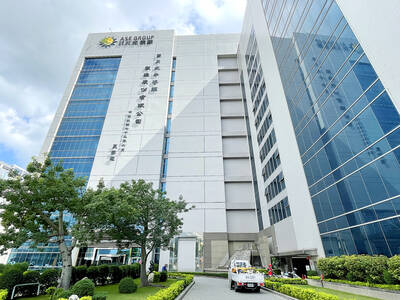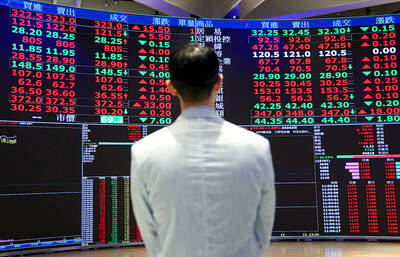Taiwanese may soon have another investment option as the Ministry of Finance (MOF) mulls the possibility of issuing convertible bonds to sell government shares in assorted financial institutions and state-run enterprises to finance public works projects.
Minister of Finance Lee Sush-der (李述德) floated the idea in a recent seminar on financial reform and unnamed ministry officials confirmed yesterday that it could translate into action immediately as measures and equipment are already in place.
Convertible bonds, or converts, give the holder the option of exchanging bonds for a predetermined number of shares in the issuing companies, which are limited to Chang Hwa Commerical Bank (彰化銀行), Hua Nan Commercial Bank (華南銀行), First Financial Holdings Co (第一金控), and other financial institutions where the government holds different ratios of stakes.
Stocks in state-run enterprises such as China Steel Corp (中鋼) and Chunghwa Telecom Co (中華電信) could also be traded as the ministry has envisioned.
Lee told the seminar that the ministry was in no hurry to dispose of government shares in those companies, but that it intended to release them in the form of convertible bonds that offer lower interest rates but provide buyers the option to trade them for stocks.
The minister said the government owns about 15 billion shares valued at NT$700 billion (US$23 billion) in various banks.
“Those assets may generate greater wealth if well managed,” Lee told the seminar in Taipei on Wednesday. “The government plans to exchange them for cash and then use the money to finance public construction projects.”
Convertible bonds, Lee said, would give the government an extra option to manage its assets and provide an extra means to adjust its finances.
Norman Yin (殷乃平), a professor at National Chengchi University’s Department of Money and Banking, agreed at some level.
Yin said converts are commonplace in investment markets abroad, but that the participants are mostly private companies rather than governments. If the government is serious about issuing convertible bonds, Yin said that measures must be drawn up to prevent business groups from taking control of business involving public interests.
“It is better to limit the trade to individual investors, although the bonds would inevitably end up in the hands of business groups if they consider purchases to be desirable,” Yin said.
Charles Yeh (葉銀華), director of the Graduate Institute of Finance at Fu Jen University, said he had no objection to issuing convertible bonds, but shared worries that it would benefit business groups.
Yeh said individual investors are less equipped financially to purchase converts when they are available in the market.

EXPANSION: The investment came as ASE in July told investors it would accelerate capacity growth to mitigate supply issues, and would boost spending by 16 percent ASE Technology Holding Co (ASE, 日月光投控), the world’s biggest chip assembly and testing service provider, yesterday said it is investing NT$17.6 billion (US$578.6 million) to build a new advanced chip packaging facility in Kaohsiung to cope with fast-growing demand from artificial intelligence (AI), high-performance-computing (HPC) and automotive applications. The new fab, called K18B, is to commence operation in the first quarter of 2028, offering chip-on-wafer-on-substrate (CoWoS) chip packaging and final testing services, ASE said in a statement. The fab is to create 2,000 new jobs upon its completion, ASE said. A wide spectrum of system-level chip packaging technologies would be available at

Taiwan’s foreign exchange reserves hit a record high at the end of last month, surpassing the US$600 billion mark for the first time, the central bank said yesterday. Last month, the country’s foreign exchange reserves rose US$5.51 billion from a month earlier to reach US$602.94 billion due to an increase in returns from the central bank’s portfolio management, the movement of other foreign currencies in the portfolio against the US dollar and the bank’s efforts to smooth the volatility of the New Taiwan dollar. Department of Foreign Exchange Director-General Eugene Tsai (蔡炯民)said a rate cut cycle launched by the US Federal Reserve

HEAVYWEIGHT: The TAIEX ended up 382.67 points, with about 280 of those points contributed by TSMC shares alone, which rose 2.56 percent to close at NT$1,400 Shares in Taiwan broke records at the end of yesterday’s session after contract chipmaker Taiwan Semiconductor Manufacturing Co (TSMC, 台積電) hit a fresh closing-high amid enthusiasm toward artificial intelligence (AI) development, dealers said. The TAIEX ended up 382.67 points, or 1.45 percent, at the day’s high of 26,761.06. Turnover totaled NT$463.09 billion (US$15.22 billion). “The local main board has repeatedly hit new closing highs in the past few sessions as investors continued to embrace high hopes about AI applications, taking cues from a strong showing in shares of US-based AI chip designer Nvidia Corp,” Hua Nan Securities Co (華南永昌證券) analyst Kevin Su

Nvidia Corp’s major server production partner Hon Hai Precision Industry Co (鴻海精密) reported 10.99 percent year-on-year growth in quarterly sales, signaling healthy demand for artificial intelligence (AI) infrastructure. Revenue totaled NT$2.06 trillion (US$67.72 billion) in the last quarter, in line with analysts’ projections, a company statement said. On a quarterly basis, revenue was up 14.47 percent. Hon Hai’s businesses cover four primary product segments: cloud and networking, smart consumer electronics, computing, and components and other products. Last quarter, “cloud and networking products delivered strong growth, components and other products demonstrated significant growth, while smart consumer electronics and computing products slightly declined,” compared with the